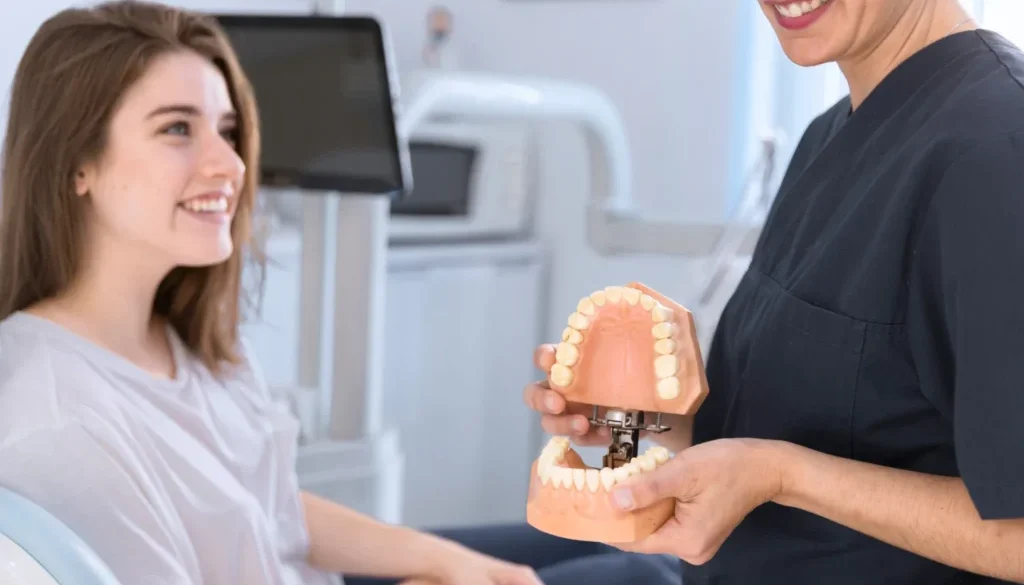Root Canal Treatment Sharjah
Understanding root canal treatment is crucial as it empowers you to make informed decisions about your dental health. Toothaches, especially persistent ones, can signal a deeper problem. A root canal might be the answer to regaining comfort and keeping your smile intact. Let’s delve into this dental procedure to understand what it is, when it’s necessary, and what to expect. At our Lifeline Clinic in Sharjah, you can trust that you’re in the expert hands of our dentistry department with Dr. Fouzul Aleem, our General Dentist specializing in root canal treatment at affordable cost.
What is Root Canal Treatment?
Root canal treatment,is the process which the dentist extracts the infected or damaged pulp from inside the tooth (the soft tissue within the tooth) and and seals it to prevent any more infection. This treatment becomes essential when the pulp gets inflamed or infected, often because of severe decay, multiple dental procedures on the tooth, or trauma.
When Do You Need Root Canal Treatment?
There are several reasons why you need a root canal process. Here are some common signs:
- Persistent pain: This is the most common symptom, ranging from dull aches to sharp, throbbing pain. It can be provoked by hot or cold foods, chewing, or even without any particular trigger.
- Sensitivity to hot and cold: Lingering discomfort after consuming hot or cold beverages/foods can indicate pulp irritation.
- Swelling and tenderness: Inflammation or infection may lead to swelling in the gums surrounding the impacted tooth. The tooth might also be tender to touch or pressure during chewing.
- Discoloration: A tooth with a dead or dying pulp may darken or become discolored.
- Visible bump (abscess): In severe cases, an infection has the potential to extend to the bone surrounding the tooth, causing a pus-filled bump on the gum.
Diagnosis
If you experience any of these symptoms, it might need a root canal treatment schedule an appointment with your dentist near you. They’ll do a thorough checkup, including X-rays, to see how much damage there is and decide if a root canal is needed, while also discussing the potential root canal treatment cost.
Treatment Options
In some cases, depending on the severity of the infection, an antibiotic might be prescribed before the root canal process. The procedure itself typically involves multiple appointments. Here’s a general breakdown:
- First Appointment: Local anesthesia numbs the area around the tooth. The dentist will make an entry point through the top of the tooth to reach the pulp. The infected pulp is then carefully removed. Cleaning and shaping the root canals follow to eliminate any remaining bacteria. Medication might be placed inside the tooth to control infection. A temporary filling seals the opening.
- Second Appointment (and sometimes more): Once any infection has subsided and the canals are thoroughly cleaned, the dentist fills the canals with a permanent material. Sometimes, the dentist might suggest getting a dental crown to restore the strength and functionality of the tooth.
Risk Factors
While this treatment is generally safe, discussing the potential root canal treatment cost and it’s important to be aware of potential risks, such as:
- Infection: Though rare, there’s a slight chance of infection after the procedure.
- Fracture: Root-canaled teeth become more brittle and susceptible to fracture, especially if not protected with a crown.
- Discomfort: Mild soreness or discomfort after the procedure is normal. However, if pain persists or worsens, contact your dentist.
Frequently Asked Questions
- Is the treatment painful?
Modern dentistry and local anesthesia ensure minimal discomfort during the process. You might experience some soreness afterwards, but pain medication can help manage it. - Do I have to get a crown after having a root canal?
Not always, but it is often recommended to restore the tooth’s strength and functionality, especially for heavily damaged teeth. - How long does it last?
With proper care, a root-canaled tooth can last a lifetime. Regular brushing, flossing, and dental checkups are crucial for maintaining good oral health. - What happens if I don’t get a root canal?
Not treating an infected tooth can cause intense pain, the formation of an abscess, and eventually, the loss of the tooth. Moreover, the infection can spread to other areas of the body. - Is a root canal the same thing as a tooth extraction?
No, a root canal aims to preserve the tooth by removing the infected pulp. and maintaining its structure. A tooth extraction removes the entire tooth, including the root. - Are there any age restrictions for root canals?
No, root canals can be performed on patients of all ages as long as their overall health allows for dental procedures. - Is it possible for a tooth that has had a root canal to become infected again?
While rare, reinfection can occur if the tooth is not sealed correctly or if new decay develops. - Are there alternatives to root canal treatment?
Extraction is an alternative, but it’s generally recommended to preserve natural teeth whenever possible . - Will I need to see a specialist for this treatment?
Most general dentists are trained to perform this treatment, if the case is complicated, you might be referred to an endodontist, who is a specialist in this treatment.

